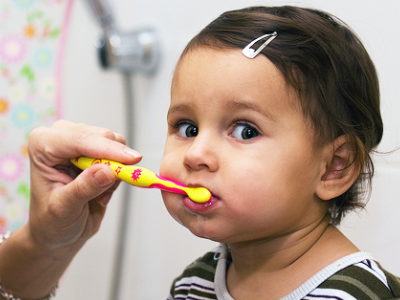Dental Care for Your Preschooler
Your toddler is learning to walk, talk, and even feed. To be sure their mouth is healthy and ready to speak clearly, see if they are getting full benefit from the food that actually makes it into their mouth.
Find out what to look out for during those frequent visits to a pediatric dentist. |
 |
Benefits of a Fixing Primary (Baby) Teeth
- Primary teeth hold space for and guide permanent teeth into their proper position.
- If a primary tooth, especially a back primary tooth (molar) is extracted (pulled) early, a space maintainer is needed. A space maintainer holds space so that a permanent tooth will have a slot to come in to. The back primary molars are lost around age twelve.
- If cavities are not fixed when they are small, they can get very large and get into the nerve of a primary tooth causing pain and infection. Children have been hospitalized with facial infections resulting from infected (abscessed) teeth. It is recommended that cavities be fixed in primary teeth to prevent pain, swelling and infection.
- Children with healthy mouths chew more easily and gain more nutrients from the foods they eat.
- Front primary teeth are important to how a child looks. Young children are developing a self-image. Healthy teeth and a pretty smile should be a big part of their self-image.
- These children learn to speak more quickly and clearly
- These children have a better chance of general health because disease in the mouth can endanger the rest of the body.
- A healthy body is attractive and can help children form a positive self-image. A bright smile can help win the confidence of peers and teachers.
- Healthy teeth save time and money. Preventive dentistry far less expensive than restorative (fillings & crowns) dentistry, so keep those six-month check-up/dental cleaning appointments. Most dental cavities are preventable with sealants, good diet habits and good oral hygiene.
|

